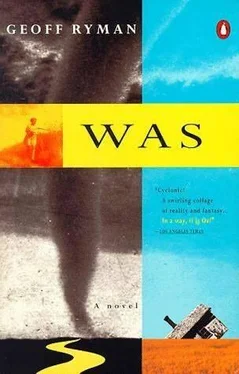"Evergreen branches, I think," said Aunty Em, talking of the decorations. "So in keeping with the season." She talked about food. "I can certainly make a lemon jelly, if you, Miss Mudge, would oblige with your famous angel cake."
"Speaking of cake," said Miss. Mudge, whose time had come. "What are we to do with Mr. Sue?"
There was a Chinaman in Manhattan. He had come with the building of the railroad. To everyone's consternation, he was a member of the Congregationalist Church. He donated unsuitable cakes. They had unsuitable writing in icing.
"God made the world," the icing said. "Tzu made this cake."
Everyone called him Mr. Sue. Using a woman's name made people smile, while preserving their old abolitionist consciences. When they smiled, Mr. Tzu thought they were smiling with pleasure at seeing him. Or at least, he smiled back. He had suddenly imported a wife, whom no one had seen. She was said to live in the rooms behind his store.
"And you've heard of his invitation, perhaps?" inquired Miss Mudge.
"Why, no," said Emma Gulch.
"He has sent a card to every church saying that his wife will be at home to receive visitors on New Year's Day."
If anyone was so lost in good works as to go, it would be Emma Gulch.
"How splendid of him," said Aunty Em. "I'm sure we will all be happy to visit."
"I'm glad to hear you say that," Miss Mudge replied and permitted herself a smile.
On New Year's Day, Calliope the mule was hauled out, snorting with cold, and was hitched to the wagon. Inside the house, Toto was barking over and over to be let out, to go with them.
"Couldn't we bring Toto with us?" Dorothy asked.
"What, bring a dog into Mrs. Purcell's parlor?" said Aunty Em. "She can just about bring herself to let us in, let alone Toto."
All the way down the lane, the sound of Toto's barking followed them.
"That's how much he misses us. But just think how snug he is next to the stove."
Even from the lane, Dorothy could see Blue Mont, on the other side of the river, four and a half miles away. It took two hours, and the mountain never seemed to get any closer. The sound of Toto followed them across the valley. They rode beside the woods, the trees as bare as burned black skeletons. Branches passed by overhead. Dorothy broke off a piece of ice and looked at the perfect imprint of the twig. "Don't suck it, Dorothy," said Aunty Em, "or you'll perforate your stomach." Dorothy began to hum to herself. Aunty Em sang hymns. With each turn of the road, Dorothy hoped for the rise and fall of the road that would signal their sudden decline toward the river.
Finally, finally they got to Manhattan, frozen stiff as always. The church ladies were gathering at Mrs. Purcell's house on South Juliette. There was an alleyway with stables behind. A boy took hold of Calliope, and Aunty Em rather grandly pressed a penny into his hand. She inspected Dorothy's dress, tugged and thumped it, and then took her hand to walk around to the front of the house, to be admitted as guests.
The door was opened by a maid. There were gas lamps everywhere, frosted glass globes, and the tops of the chairs were dark and polished and carved into the shapes of leaves. From somewhere behind all the front rooms, there came a chorus of baby cries. The ladies, buttoned in black, sat in a circle amid a forest of tea tables.
Mrs. Elliott was there for the Methodists, the wife of the man who had brought Grandfather Matthew's career to an end. Mrs. Parker was there from Aunty Em's own church, as if Aunty Em were not sufficient in herself to represent the Congregationalists.
The Purcells were Presbyterian and owned the bank that had sold the mortgage to Emma Gulch's farm.
Dorothy knew of these people. She was interested to see them. She wondered how it was that Aunty Em could bear to smile at them. Dorothy looked at the frosted lamps, at the line of fuel within them like water under ice. She pretended to herself that the lamps had grown naturally frozen out of the Zeandale marshes.
Mrs. Purcell, no longer young, but very brisk and pleasant, came in with baby John. He had just been born a few months before. He was passed around the ladies, who complimented him and talked to him. Baby John beamed like an ancient old man. "Happy New Year! Happy New Year!" the ladies piped.
"His little hand!" cooed Aunty Em.
Dorothy peered into his soft, unformed face. Intelligence in his eyes met hers.
"Bah bah," he said. "Mo ta woe?"
It was how babies talked.
"Oh yes? Oh yes?" said Mrs. Parker too brightly, as if she understood. Maybe she did. The baby was passed to a maid to be taken upstairs. Tea and cakes were served, and the adults talked about Chinese people.
"Apparently they fry all their food in very hot oils," said Mrs. Elliott. "My cousin visited such a home once, and her fur collar smelled peculiar for weeks. They couldn't think what the odor was; it was so unpleasant, but not at all identifiable. Finally someone said it was burned sesame seed oil."
Mrs. Parker produced a nosegay from her purse and silently held it out. "I shall endeavor not to resort to this, since I'm sure Mrs. Sue will do her utmost to be polite."
"It's not the oil, it's the incense that will choke me," said Mrs. Lyman. She was the doctor's wife and she was beautiful and young, with red hair. Aunty Em made a point of chuckling. Mrs. Lyman was from St. George, just across the river from the Gulch farm. Aunty Em always made a point of saying how enchanting she found her. "Just a good, plain-speaking Kansas beauty," Aunty Em would say, again and again.
"Well," said a woman whose name Dorothy did not know. "My tablecloth came back cleaner than the gravel by the river."
Dorothy did not know much about the Chinaman herself, but she could see that the adults were frightened of him.
The seven ladies, Baptist, Methodist, Congregationalist, Lutheran, wrapped themselves in scarves and pinned on hats and were helped into coats that nearly reached the ground. They walked unsteadily on the boardwalk of South Juliette, north toward Poyntz, the main avenue. They walked past one Methodist church and Mrs. Elliott's house. They walked across Houston, past the Bowers' and the Buells'. On the corner of Poyntz and Juliette was Aunty Em's own church, white limestone, small. They turned right and swept down the broad main avenue.
Poyntz was lined with wooden-frame buildings, with wooden awnings that stretched out over the wooden sidewalks. The ladies passed another Methodist church, with a tall, graceful spire, and an Episcopalian and a Presbyterian. They passed the Manhattan Institute, which was a hospital built of brick. There was Huntress's Dry Goods, a two-story building of stone. On Poyntz Avenue alone, there were four banks, three land offices, three drugstores, a lumberyard, several general stores, clothing stores, hotels and two county offices. There were many businesses, with many owners, but amid those many names, a favored few kept reappearing: Higinbotham, Stingley, Elliott, Purcell.
The street was shuttered and closed, peaceful and safe. An old black man everyone called Uncle was sweeping the ice that covered the boardwalk. Someone Mrs. Elliott knew passed them, tipping his hat, breathing out vapor into the sunlight, nodding "Good morning, ladies," as he passed.
Mr. Sue's shop stood near the corner of Humboldt and Second, opposite the Wagon Shop.
There was a wide space around it, a market garden that was the town's only source of sorrel and green peppers. The laundry hissed out back, white steam rising up even on New Year's Day. Dorothy took hold of Aunty Em's hand, afraid.
The store was dark. Mrs. Purcell took it on herself to try the door. It opened with a clinking of bits of metal hung across the doorway. They peered inside, into scented shadow.
Читать дальше












